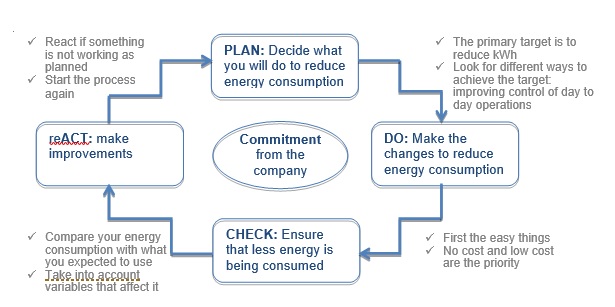Energy management systems
Time and again energy efficiency in industry has been demonstrated to be cost effective while having a positive effect on productivity. Despite this, energy efficiency improvements with very favorable payback periods often do not get implemented. When projects are implemented, it may often happen that results are not sustained due to lack of supportive operational and maintenance practices. Energy efficiency is still widely viewed as a luxury rather than a strategic investment in future profitability.
Energy management systems and standards provide a proven tools and best-practice methodology to integrate energy efficiency in industry corporate culture and daily management. Energy management system (EnMS) standards can drive and provide the framework needed for the organizational and individual behavioural change that is required to effecting sustainable and continual improving energy efficiency in industry; the behavioural change needed to go beyond the technology, equipment and stand-alone project approach to energy efficiency that is currently mainstreamed in industry as well as in the service market.
An EnMS is how an organisation manages its people, energy information and technology to improve its energy performance. It means applying good management practices to day-to-day operations to reduce energy consumption. A set of business process is needed to ensure optimum use of available resources and that all personnel involved have clear roles and responsibilities.
The EnMS is based on a cycle of developing real commitment to accepting the need for change and support from top management. It requires the development of a set of plans of how performance will be improved and a coherent approach to implementing the changes, projects and other initiatives to improve performance.
After the implementation of these plans verification is required to check the improvements and that the system is functioning properly. The EnMS based on a cycle of continuous improvement of performance and continuous improvement of the management system itself.

